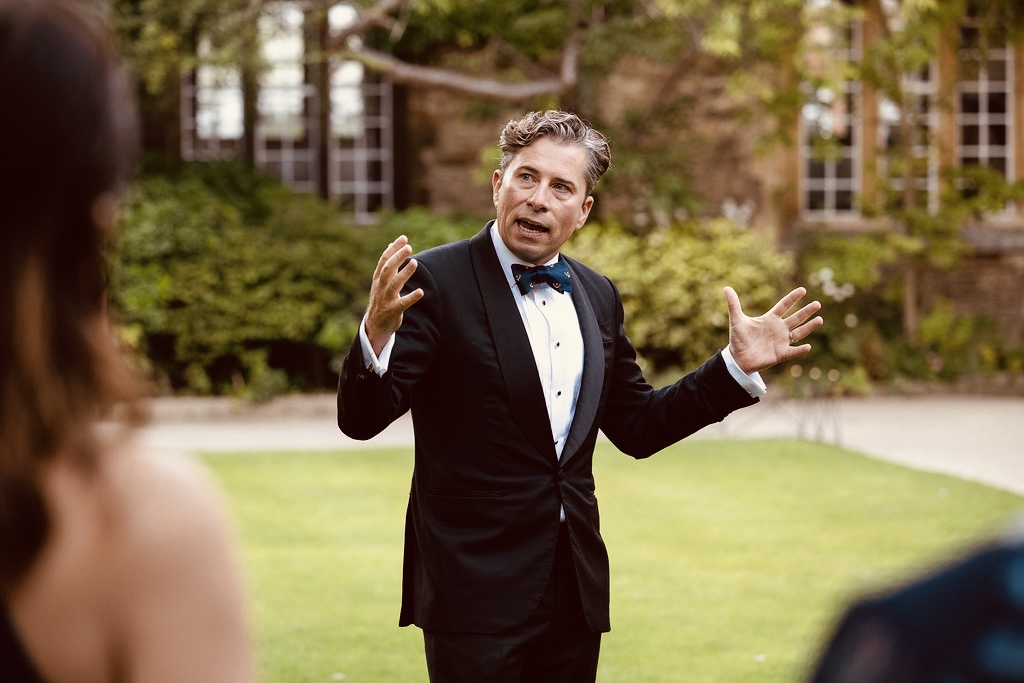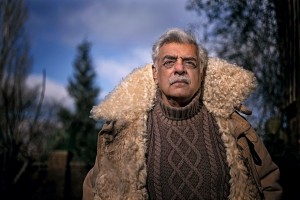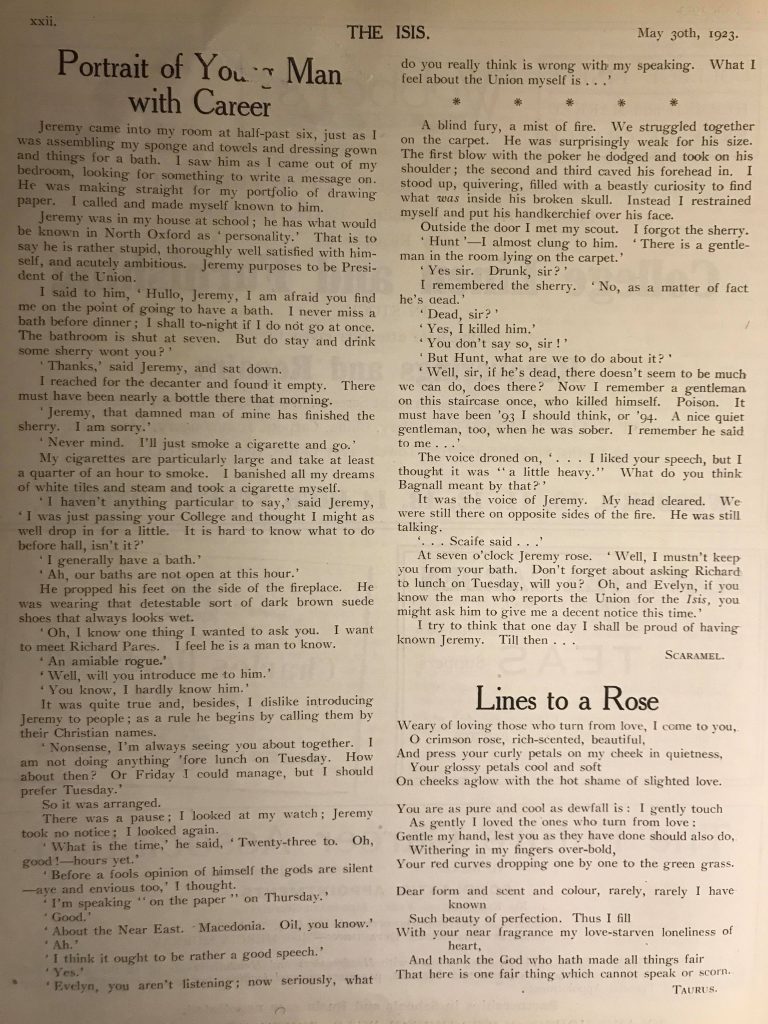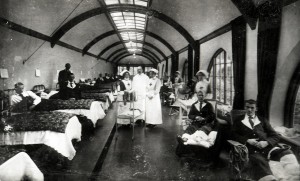In Conversation with the Naked Diplomat, Tom Fletcher CMG, Principal of Hertford
by Issy Proctor | June 25, 2024

There are rumours that he is being courted by the Labour party to rejoin the world of government, that he will be the next ambassador to the US. Slightly more exciting than the news coverage of your average Head of House at Oxford, many of whom we dismiss as excessively wealthy reminders of old Oxford.
Tom Fletcher CMG isn’t new to a media flurry, having been a diplomat until 2015, an author, and since 2019, Principal of Hertford. Current speculation about a return to diplomacy has been fuelled by his book, Ten Survival Skills for a World in Flux, appearing behind Keir Starmer in a campaign photo, along with Dan Jarvis’ memoir. Certainly intriguing, but Fletcher’s career is really characterised by his book The Naked Diplomat which details the history of diplomacy and offers a model for the ideal ambassador, “lobbyist, leader, communicator, pioneer, entrepreneur, activist, campaigner, advocate.” Fletcher appears to be many, perhaps all, of these things and Antony Sattin’s 2016 comment in The Guardian attests to how “unsurprised” he would be “if Fletcher ended up running the Foreign Office, or the country.” But Tom Fletcher CMG assures Isis Magazine that he will remain Principal of Hertford College until at least 2028.
In 1997, with a First Class BA in Modern History, Fletcher joined the Civil Service Fast Stream. Working for the Foreign, Commonwealth and Development Office, he spent his early 20s in Nairobi, and his late 20s in Paris. His charity boxing match with the Mayor of Nairobi is remembered for the mayor’s slogan: Fletcher goes home on a stretcher, which he “very nearly did”. He has been the Private Secretary to Baroness Amos, now Master at University College. He has served in 10, Downing Street, as foreign policy and Northern Ireland advisor to Tony Blair, Gordon Brown, and David Cameron. And from 2011 to 2015, Tom Fletcher was the British Ambassador to Lebanon, returning to Oxford in 2019 as Head of House at his alma mater.
Having initially applied to Lincoln to study English and History and “really botched the interview”. Fletcher was rejected, laughingly saying “they would have been mad to take me!” He then took a gap year in 1993, teaching in Israel and Palestine. After a year travelling around the Middle East, Fletcher applied to Hertford. He attributes his confidence to apply to the FCDO to his time in Oxford and experience as JCR President.
He recalls the application process to the Fast Stream as “the hardest thing I ever did until I tried to be Principal at Hertford,” a year of interviews and vetting, being asked about all the silly things he may have done at university. Fletcher wouldn’t describe his younger self as “a particularly rebellious or risk-taking kind of character” but admits there were enough probing questions to make for an “interesting conversation”.
Fletcher claims not to have excelled in the Office’s language aptitude test though he went on to learn Swahili for his posting to Nairobi, French for Paris, and Arabic for Lebanon. Ever the diplomat, he cannot pick a favourite country, as he has such fond memories from all his postings. He grins, remembering “and having that freedom to go all over the country, extraordinarily beautiful. And then to go to Paris in my late 20s, you know, live in Le Marais… amazing embassy. Everyone’s second city, of course, is Paris.” And, in a moment of nostalgia, “I did fall in love with Lebanon,” “the culture, the landscape, the people” and the “resilience”.
We move onto his attitude towards the Commonwealth, noting how the perception of Britain’s relationships with countries it had previously colonised has shifted since Fletcher’s time in Kenya. He is reflective, “We should understand the way in which our history is perceived by others and that doesn’t mean we should retreat from our history but that we should learn it.”
Of his time working in Number 10, he quips that he saw “four years, three prime ministers. In those days that took four years, now it takes about 3 weeks.” Disappointingly, Fletcher declined to comment on which PM he admired the most, saying that the three prime ministers he had worked with were “some of the most impressive people I’d ever met, as you’d hope, to get to that level.” Curiously he says: “They all defied the stereotypes that people had of them.”
During his career, Fletcher collected a book of advice from the influential people he met. Conscious of being away for long periods of time when his sons were younger, he asked world leaders, diplomats, and celebrities to write down the advice that they would give his children when they’re 14 and “old enough to really understand this.” Charlie and Theodore Fletcher now have the wisdom (and signatures) of “Gorbachevrecounts how “Barack Obama, when he wrote his advice, said Charlie will either be very clever or very rich depending on whether he sells the book.” Perhaps J. K. Rowling’s signature will be less in demand, but many would be envious of the messages from Nelson Mandela, David Beckham, and Pelé.
“If you distil all that advice, it comes down to three things: be curious, be kind, be brave.” Though, “there were two world leaders, I won’t say who, who would see other people writing [in the book] and would come across and ask: ‘Do you want me to—’ and I would say ‘No, it’s ok!’” Sadly, we can only speculate about the identity of these rejected leaders.
One leader associated with Fletcher is that of the Labour Party, as Keir Starmer had Fletcher’s book on education, Ten Survival Skills for a World in Flux, in a campaign photo, “I was amazed, I knew that he’d read it, but I was very pleased to see that.” Fletcher notes that Bridget Phillipson is Hertford alum, and he hopes “when they [the Labour party] are thinking about education someone is reading that”. Education is close to Fletcher’s heart, a recent post about Ten Survival Skills on X, formerly Twitter, gave a “spoiler alert” for the chapter on what we really need to teach: “not just maths”. Fletcher worries that “we’re teaching kids to be second-class robots and not first-class humans. And I think we need to spend much more time thinking about creativity, curiosity, problem-solving, critical thinking.”
As he advocates for the political capacity of the media, I ask Fletcher about the conversation being had between OA4P, the student body, and the Vice Chancellor. He is measured in his response, stating the importance of remembering that “we are one community, and we are not the centre of the universe. What matters is getting a ceasefire and stopping the violence against all civilians.” In Oxford, “We’ve got to listen to each other,” “we’ve got to do what we do well at Oxford which is be practical and come up with solutions.” He adds gravely, “we reacted faster to the Ukraine crisis and the displacement of Ukrainian academics” though he notes that the Vice Chancellor has been speaking to Palestinian academics about “online education as well as scholarships. So, I think that’s really positive”. But Fletcher does welcome a “proper conversation about our investments as well, and that’s a big practical way that we can make sure we’re doing no harm.” He is resolute, “All of us need to keep reviewing our investment principles to make sure that we’re not supporting anything that is breaching international law.” His X, formerly Twitter, feed demonstrates his engagement with both OA4P and the Jewish community in Oxford, on 26th May, he tweeted “Enjoyed coffee talking to students at their Gaza protest camp this morning, then some ginger honey at Jewish cultural fair,” concluding: “Contrary to view in parts of media, Oxford is not tearing itself apart.”
Fletcher sheds light on the political positions of colleges; apparently charity law restricts colleges from taking political stances. “I can go on Radio 4 and say: ‘We must stop this violence against civilians’ in my private capacity, not my role as Principal of Hertford, certainly not as Hertford College.” Definitely food for thought in terms of what is ‘political’ and colleges’ motivations for being registered charities—though that is common practice for educational institutions across the UK.
Personally, Fletcher would agree that he has become a more political figure as his career has progressed, “small p political, as a former civil servant, I’m quite a centrist dad” having served both Labour and Conservative PMs with “equal loyalty”, Fletcher still feels he has that “civil service neutrality”. Originally thinking he would only leave the civil service for a year, to write The Naked Diplomat, his plan changed when “the world went crazy” with Trump and Putin. He appreciated how Oxford acts as a place to have the difficult conversations that politics and the media omit, “interaction between cultures and ideas and where it’s okay to admit that you don’t have all the answers.” Interestingly, Fletcher’s two novels portray an ambassador realising he must become more political to enact change, going rogue in a way which Fletcher assured me he did not Though we may reflect on the time he has spent with student protestors, his nuanced and considered responses to the crisis in Gaza compared to the hardline the Vice Chancellor’s office has taken.
He finds it fascinating how no one in Oxford realises the power they have, “if you talk to the people running the university, they’ll say that the power is in the colleges, if you talk to the colleges, they’ll say that the power is in the fellows, if you talk to the fellows, they’ll say that the power is in the university. Everyone thinks someone else has power.” He views this disaggregated model as “a great strength” to Oxford but observes how it allows for people to “abdicate responsibility”.
On access, trashing, and elitism, Fletcher concludes, “Ultimately, Oxford is an elite institution because we are finding the smartest young people that we can, but it doesn’t mean it [the University] must act politically, socially in that [elitist] way. We can find different ways to be elite, we can be elite through the quality of our teaching and our research and what we do in community and the way that we are a frontline for a better society. We don’t have to do it [be elite] by spraying champagne.” We agree that tradition is what makes Oxford unique, and Fletcher adds: “I think it’s for every generation as they come through to work out which rituals, which rites of passage, which traditions, should we hold on to and which should we change or get rid of.”
In terms of Fletcher’s next chapter in his career, his novels have been very successful, there are whispers of his books being adapted for TV, he hopes to “build a new library, build a grad centre, decarbonise the estate, come up with the next big idea on access, rethink our business model.” He “was surprised” by the BBC naming him as potentially the next ambassador to the US, “there’s no chance of that, I’m not leaving here.” Fletcher thinks that “to really make an impression at Oxford, you’ve got to do eight years, as a head of house,” which would take him to 2028, “I’ll be 53, I won’t be completely knackered.” He confirms, “this isn’t my last job.”
Fletcher doesn’t have a media advisor, confiding that “the advantage of being a diplomat is they [interviewers] don’t ask you really tough questions.” So, I ask a tough question: whether Fletcher thinks a Middle East Peace Process is achievable.
“It is, and we have to keep working and hoping for it. The big prize on offer is a normalisation between Israel and the whole Arab world, where they work in partnership with Israel in return for a proper viable Palestinian state that then gives security justice opportunity to both the Palestinians and the Israelis. I think that is possible; it’s really hard, it will take masses of work and proper, genuine pressure from the Americans.”
At the end of this hopeful, thoughtful conversation which reassured me that there is still a place for nuance in politics and diplomacy, I felt slightly envious of Hertford students. I was also left wondering about our responsibility as university students as Fletcher words: “if they [young people] were just going to accept the world that we’ve left them, I would be really worried” echo in my head.∎
Words by Issy Proctor. Image Courtesy of Tom Fletcher.




